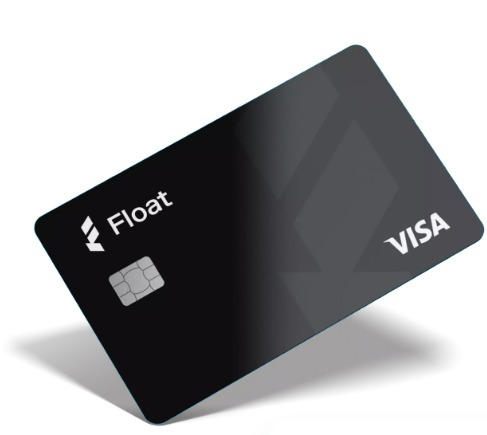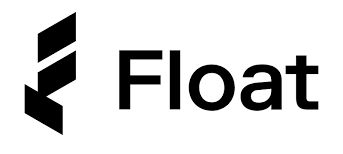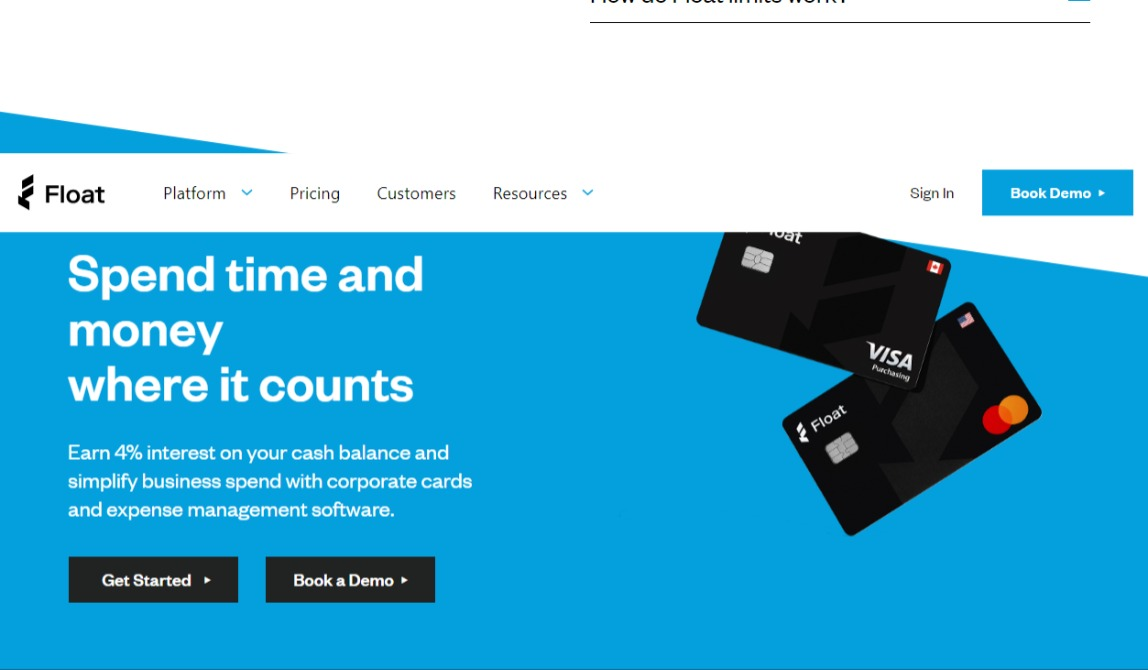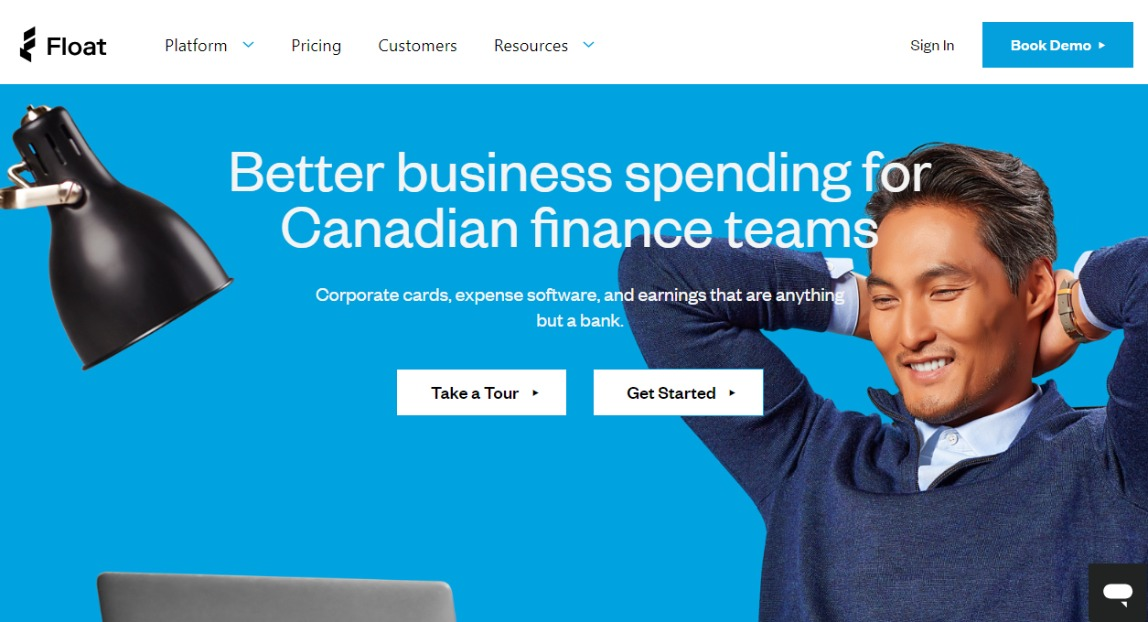
Float Card is one of the most suitable credit cards for businesses in Canada that requires a credit card but haven’t built an eligible credit score to make them eligible for a traditional credit card.
This guide will look at the Float card, what it entails, how it works, cost, fees, types, benefits, drawbacks, and every fundamental information you need.
What is the Float Card?

The Float card called the Float Visa Credit card in full, is a prepaid business credit card issued by Float Financial, a Canadian Tech Startup, to make corporate spending more streamlined and easier.
The float credit card offers integrated spend management software that helps businesses in Canada to solve the problem of managing their expenses and making purchases. With this embedded software, you can easily allocate funds and approve expenses before making a purchase, making the process easier.
Float cards can be physical or virtual, with custom names, credit limits, and vendor restrictions. You don’t need a personal guarantee to qualify for a float card.
Additionally, float cards help to automate some aspects of bookkeeping, making it a perfect choice for small and medium-sized businesses that want to save time and make payment more streamlined.
Float card application is fast and gets approved in 1-3 business days. The only limitation of the floating card is that t functions on a prepaid card model, making it unsuitable for businesses that don’t have the cash to fund the car to make purchases.
Disclosure: My site is reader-supported. I may get commissions when you click through the affiliate links (that are great products I use and stand by) on my articles.

The Ultimate Guide to Float Card
- Float Card is one of the most suitable credit cards for businesses in Canada that require a credit card but haven’t built an eligible credit score to make them eligible for a traditional credit card.
- This guide will look at the Float card, what it entails, how it works, cost, fees, types, benefits, drawbacks, and every fundamental information you need.
How Does the Float Credit Card Work?

Float card is a corporate credit card that aims at streamlining expense tracking, business spending, and reporting by combining features of automation, accessibility, and management.
To get started with a float card, here are the steps to follow:
- Application – The first thing to do is to apply for the card by submitting a 5-minute application. You will get approved in one to three business days.
- Account funding – The next thing to do after getting your card is to fund the account. Float credit cards function on a prepaid model. Your card gets funded directly by your business bank account. As such, you must connect your bank account to your Float account and quickly add funds.
- Create Card(s) – After funding, the next thing to do is to create and customize physical or virtual cards through the mobile app or web application/ if you are going for virtual cards, you can instantly create them. Physical cards take a few days to be created and shipped to you.
- Usage – After creating and funding the account, you can use the cards like other credit cards to make payments or online purchases.
- Expenses tracking – The float card comes with a mobile app or web application that you can use to track your receipts and transactions in real time.
- Card management – You can manage your float card through its application or mobile app. You can add new cards, add or limit employee access, change card limits, and set spending rules. Additionally, you can easily edit, approve, and deny financial requests straight from your online dashboard.
Float Credit Card Fees

Float Credit Card offers two available plans: They are Essentials and Professionals. They both have different fees and offer different levels of packages.
Essentials Plan – $0/month
The Essentials plan is free and is the basic plan for smaller businesses with fewer cardholders (1-5) that only need basic approval processes.
The Essential plan offers only a limit of 5 physical cards, and you can set up unlimited virtual cards. Additionally, the Essentials plan offers you access to easy-to-learn features.
Professionals Plan – $99/month
The Professionals plan is a paid plan that costs $99 per month plus tax and offers a 60-day free trial. This plan suits medium to larger businesses that need multiple transaction approval levels and more than five physical cards.
The Professionals plan offers premium services such as advanced spend management software that supports multi-level approval workflows, multiple card management, and card assignment.
The Professionals plan also offers a “Personalized Onboarding” feature where you will be linked to a representative to help you get started and explain the features.
Float Credit Card Benefits

Here are some of the benefits you will stand to enjoy as a float credit card holder.
It does not require a credit check.
One of the advantages of a float card is that it does not require a credit check since it is not a debt product. As such, small nosiness and startups with no or little credit score can apply for it, and their request will get approved between one to three business days.
Enhances business spending capability
Float card functions on a prepaid model and has a spending limit of $500,000 if your card is duly funded. Float card covers all your purchases, whether high-value purchases, online subscriptions, or small recurring purchases. The maximum limit of purchase per transaction is $100,000.
Enable instant creation of virtual credit cards.
Another benefit of float cards is that they allow you to instantly create an unlimited number of virtual cards that you can use for online purchases. The only limitation of these virtual cards is that they cannot be used at the point of sale.
Enhanced management of credit card
Float corporate credit cards offer features that enhance credit card management, such as smart reporting, tracking, supervision, and financial protection. Also, you can do the following through its card management feature;
- Set credit limit
- Set expiry dates for virtual cards
- Set a vendors limit that limits the card to be used for a particular vendor or vendors.
- Set card names, purposes, descriptions, and tags
- Single-use virtual cards creation
- Set receipt requirements
- Set funding limits
- Set multi-level approval workflows
- Manage teams
- Set accounting automation
- Credit card monitoring
Offers cashback on purchases
Another major benefit of the float card is that it has a cashback program that gives you 1% cash back on every dollar you spend monthly above $25,000.
Maintains an integrated accounting software
Float offers integrated account software that caters to some aspects of bookkeeping that helps you to save time and energy. The Essentials and Professional plans allow seamless integrations with Xero and QuickBooks.
Enjoy perks from Float’s partners.
As a cardholder, you can enjoy exclusive perks from Float’s partners. Here is the current list of Float’s partners.
- AWS (Amazon Web Services)
- Forma AI
- Intercom
- ReachDesk
- Gorgias
- Hubspot
- ClickUp
- Quickbooks Online
- DocSend
- Very Good Security
- Junip
- Deel
- Notion
- OpenPhone
- Remote
- Retool
- Fellow
- Carta

The Ultimate Guide to Float Card
- Float Card is one of the most suitable credit cards for businesses in Canada that require a credit card but haven’t built an eligible credit score to make them eligible for a traditional credit card.
- This guide will look at the Float card, what it entails, how it works, cost, fees, types, benefits, drawbacks, and every fundamental information you need.
Float Credit Card Drawbacks

Here are some of the limitations of using a float credit card.
Limited physical cards
The Essentials plan only grants you access to five physical cards. This is suitable for small businesses that have less than ten employees. If your business is large and you need more physical cards, subscribe to the Professionals plan to cater to your business needs effectively.
The card must be funded.
The float card works on a prepaid model that requires funding before you make any purchase. One major advantage of this is that this saves you the stress of getting into debt or being charged a high-interest rate.
Fixed cashback rate
Float offers a fixed cashback benefit at a flat rate of 1% on all transactions after spending $25,000 monthly. This might be difficult for small businesses or startups that don’t spend more than 25,000 monthly. In this case, there is no cash back for them.
Does Float Have a Charge Card?
Yes, float introduced a charge card in 2022 after realizing that the Float card pre-paid model isn’t suitable for every business or enterprise.
Float Card Automation
One feature that makes Float Credit Card stand out from other credit cards is that it offers an automated system that requires automating some aspects of the business. The areas that can be automated are as follows:
- Automate receipt reminders – You can use Float to automate receipt reminders by sending reminder emails to cardholders when receipts are not uploaded for purchases.
- Automatic top-ups – You can automate your float account to receive funds automatically from your bank when your bank accounts fall below a certain level.
- Automatic receipt matching and capture – With your float card, you can easily eliminate the manual process of collecting receipts, accounting for transactions, and calculating tax. You can sync all transactions to the software in real time, thus saving you time!
Who is the Float Charge Card Suitable For?

As your business grows, you will need to extend your cash runway. To meet his need, Float introduces the new Charge Card product that offers eligible customers 30-day unsecured credit terms with high limits.
Float Charge Card is accepted everywhere that VISA card is accepted. It offers eligible customers 5x or 10x higher spending limits than big bank credit cards without requesting a collateral or personal guarantee. Also, the businesses can maintain a monthly credit limit of up to $750,000.
Specifically, the Float Charge Card is designed for Canadian companies that spend more than 50,000 per month via credit cards. To be eligible, the business must show over 12 months of operating runway in their bank account. If the months of operation are less than 12 months, the business must show a consistent profit.
Also, the businesses must have $250,000 in cash or equivalents, for example, GICs. However, the Float Charge Card is not currently available for businesses in cryptocurrency or non-profit ventures.
Is Float Visa Legit?
Float Visa is legit and offered by Financial Solutions Inc., a Toronto-based fintech company established in 2019. They are backed by reputable companies such as Tiger Global, Garage Capital, Golden Ventures, Susa, Shopify, Xero, Wave, Uber, and H&R Block senior executives.
You can also go to Avalon and input Float to attest to its legitimacy.
What Information Do You Need To Apply For A Float Credit Card?
To apply for a Float card, you must provide your legal business name, home address, date of birth, and other personal information.
Float does not carry out hard credit checks, but you must provide your ID to validate your identity and a copy of some mail to confirm your address.
Does Float integrate with Accounting Software?
Float’s Essential and Professional plans offer free integration with Quickbooks and Xero. However, if you want to use more advanced accounting software such as NetSuite or Saga, you must switch to the Professional plan, which costs $99 plus tax per month.
Does Float Charge FX Fees?
No. Float card does not charge any foreign exchange transaction fees or premiums. It might charge later in the future, but for now, it doesn’t.

The Ultimate Guide to Float Card
- Float Card is one of the most suitable credit cards for businesses in Canada that require a credit card but haven’t built an eligible credit score to make them eligible for a traditional credit card.
- This guide will look at the Float card, what it entails, how it works, cost, fees, types, benefits, drawbacks, and every fundamental information you need.
How Does Float Cashback Work?
As a Float credit card holder, you will be eligible to receive 1% cash back for every dollar you spend above $25,000 each month. So, if you’re spending for the month s less than 25,000, you won’t receive any cashback. This makes it unsuitable for small businesses and startups with low spending to benefit from the cashback program.
Conclusion
Float cards are among the best credit cards for businesses that want to increase their work efficiency and financial management. The basic plan can be done for small businesses, but for medium and large businesses with multiple workflows, the paid plan will be more suitable. Always keep in touch with Float’s official website to get updated information on their cards.






